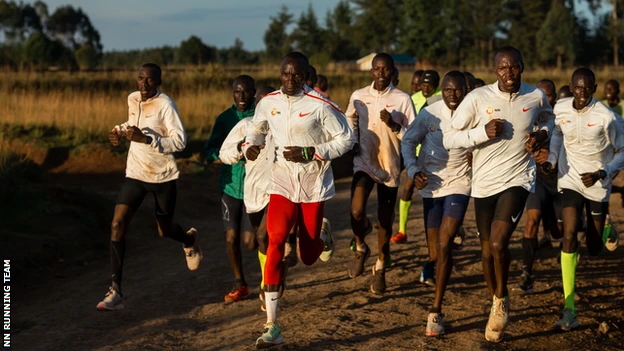Moxie: Inputs Over Outputs
Aug 11, 2025"Only the disciplined ones are free."
ONE STORY
"Inputs"
Before the sun’s up in the mountains of Kenya, he’s already out the door.
No alarm. No morning scrolling. Just the sound of his shoes hitting a dusty road with his friends.
He runs every day.
Every. Day.
Not chasing a record. Not preparing for a big race.
He runs because it’s Tuesday. Because it’s what he does.
The training camp is as simple as it gets: A few teammates. Basic food. Shared chores.
This rhythm never changes.
Years of this. Same focus. Same inputs. No drama.

(Eliud Kipchoge on a run in his home country of Kenya. He is often joined by 40 or 50 other runners on longer runs.)
And the "Outputs"?
Who are we talking about?
Eliud Kipchoge. Widely considered the greatest marathon runner of all time.
Olympic gold. Marathon world record holder. The first human to run 26.2 miles in under two hours.
Ask him, and he’ll tell you: those weren’t the goal.
They were simply the byproduct of doing the right things, every single day.
“Only the disciplined ones are free,” he says.
For Eliud, only the inputs get his attention. Do this consistently enough, for long enough, and the outputs take care of themselves.
It’s like tending a garden. You water it. You pull the weeds. You do it again tomorrow.
And one day, the flowers are there.
(On a flat course in Vienna, with rotating pacers and Nike’s support, Eliud Kipchoge ran 1:59:40, the first sub-two-hour marathon, built on years of discipline and process.)
The Brain Science
It turns out, our brains love the output. The win, the records, and the applause.
Dopamine spikes just thinking about it.
But here’s the catch: the more we fixate on the result, the more anxious we get.
And anxious brains don’t perform at their best.
The better way is what psychologists call process orientation. Place your attention on the inputs. On the controllable actions, not the uncontrollable results.
Do the right things, the right way, again and again.
Repetition turns effort into instinct.
Ritual removes decision fatigue.
Minimal distractions = maximal focus.
Build the environment for great work, and the work will be great.
📜 TWO QUOTES
"Concentrate on what will produce results rather than on the results, the process rather than the prize."
— Bill Walsh
“Great things are done by a series of small things brought together.”
— Vincent van Gogh
🚀 THREE TAKEAWAYS
1. Performance anxiety isn’t a talent problem. It’s an attention problem.
Put your focus on what you can control, and your nervous system will follow your lead. Calm follows control.
2. It's the consistent focus on the work (that no one sees) that creates the headlines (everyone talks about).
Greatness is built off-camera. It's the quiet, consistent work that eventually roars.
3. Discipline is the most courageous task.
The bravest moments aren’t dramatic. They’re the ones where you don’t want to show up, have every excuse not to, but do the work anyway.
🔍 MOXIE REFLECTIONS
- What outcome are you most anxious about? Now, what within that situation can you absolutely control?
-
What inputs give you the greatest ROI–in your job, within your relationships, for your own self-care?
-
What "input" is absolutely essential for you each and every day?
🛠️ TOOLS FOR GROWTH
🧩 PATTERN RECOGNITION: Outcome Bias
Outcome Bias is our tendency to judge the quality of a decision solely by its result, instead of by the soundness of the process that led to it.
Why it matters: When a decision works out well, we assume it must have been a good decision — even if it was based on poor reasoning, bad data, or sheer luck. The reverse is also true: a sound decision that produces a bad result gets labeled a “mistake.”
Result: We become obsessed with the scoreboard instead of the playbook. We copy “winners” without understanding why they won. And we abandon good systems too soon because the early results aren’t pretty.
🧠 MENTAL SKILL OF THE WEEK: Process Orientation
Process Orientation is the skill of directing your focus toward the actions you can control, instead of the outcomes you can’t. It’s not ignoring the goal; it’s refusing to let the scoreboard dictate your attention.
How to use it: Define three controllable inputs that, if done consistently, make success inevitable over time. Track those, not the results. Ask yourself daily, “Did I win the day’s process?” Not, “Did I win?”
The paradox: The less you chase the outcome, the more likely you are to achieve it. By investing in the right inputs over and over, you remove the pressure that kills performance–and free yourself to perform at your best when it matters most.
🌱 ONE MORE THING
(Eliud training in his home country with friends.)
We love the outcome because it’s visible. Tangible. Easy to measure. But the real magic happens where no one is looking.
The workouts before sunrise. The quiet decision to rest when you want to push. The choice to keep going when you’d rather stop.
These moments aren’t dramatic, and they don’t trend. But they are the scaffolding that holds up every world record, every breakthrough, every gold medal.
Tend to the process like it’s the only thing that matters.
Because in the end, it’s the only thing you can actually control.

